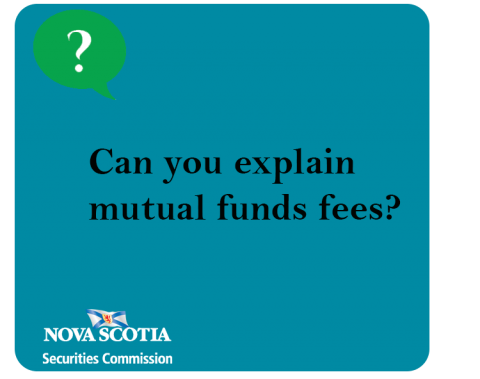Submitted by nsscadmin on

After discussing how advisers are paid last week, we had a similar question come up regarding mutual funds fees. Mutual funds are a very popular investment vehicle which we discussed in a previous post. We briefly looked at mutual funds fees in the post, but investors were still left with some questions, especially after we looked at paying advisers last week. So, let’s talk about mutual fund fees.
When you invest in a mutual fund you pay the mutual fund manager that manages your fund. This cost is called a Management Expense Ratio, or MER. The MER consists of management fees, administrative costs of the fund manager as well as trailing commissions paid to your advisor or firm by the fund manager. You can see what the MER of a mutual fund is by looking at the Fund Facts for the specific fund that you invest in. The MER is reported as a percentage and taken from your returns. For example, if an MER is listed as one per cent and the fund had a five per cent return, you would receive five percent but the real return of the fund would have been six percent. The one per cent goes to the mutual fund manager (and a portion of that would be paid to your adviser or firm). This is not reported to you on your return statements - You would only see a return of five per cent.
Along with the MER paid to the fund manager, you may also pay fees when a mutual fund is purchased or sold known as loads. A load is a one-time fee.
The type of load fees you’ll pay are Front End Loads and Back End Loads (also called deferred sales charges, or DSCs).
A front end load is paid to a mutual fund dealer at the time of purchase. This is a calculated as a percentage of your initial purchase and typically ranges from 1 to 5 per cent. For example, if you were to invest $10,000 in a mutual fund and were charged a front end load of one per cent, your dealer would receive $100 and $9900 would be invested in the mutual fund.
A back end load (or deferred sales charge), does not have an upfront cost to the investor. Instead the mutual fund company pays your adviser an upfront commission on your behalf, typically amounting to five percent of the amount purchased. The investor pays a redemption fee when they sell the fund. The amount of the redemption fee depends on how long you were invested in the fund.
Some mutual fund companies offer no-load funds. These funds do not have any charges when purchased or redeemed.
However most mutual funds, whether they have a front-end, back-end or no-load, still pay trailing commissions to your advisor which are embedded into the fund’s MER. Trailing commissions, or trailers are paid as long as you hold the fund. These trailers are how your adviser and/or their firm are paid for the investment advice they provide. The amount of a trailing commission can vary, but typically is between 0.25 to 2 per cent.
An alternative to the above fee models is a fee based model where the amount of mutual fund fee is negotiated between the investor and the dealer.
